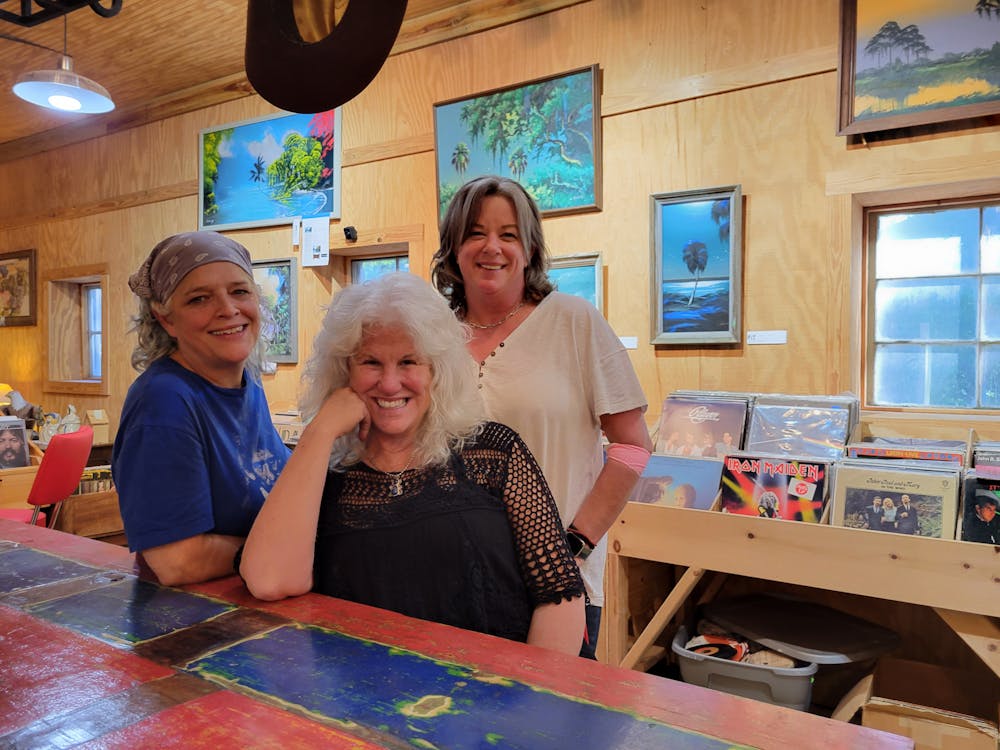Draped in rainbow flags, the historic, small town of Micanopy thronged to the polls on election day — on the ballot: a review of the community’s stance on LGBTQ inclusivity.
After the year began with controversy, the town’s electorate decided to reconsider its values and look toward new leadership. The last election was the first time in years more than 54% of the voting population participated, newly appointed Micanopy Mayor Jiana Williams said.
On March 14, Micanopy, a town of less than 650 residents 12 miles south of Gainesville, ousted Commissioner Mike Roberts, whose alleged anti-LGBTQ remarks made the LGBTQ owners of gift shop Restless Mommas decide to leave town out of concern for their safety.
The unusually crowded town hall erupted into applause as the vote was called.
In a landslide victory with 63% of the vote, John Ken Wessberg, a Micanopy resident of only two years, beat incumbent Roberts, a second-generation commissioner whose father served for over 40 years.
Wessberg, a retired firefighter from New York, was approached by community leaders who urged him to run after word quickly spread of Roberts’ alleged behavior.
“I wasn’t going after him personally,” he said. “But his values and my values are different.”
For seven weeks, Wessberg spent every day knocking on doors and listening to his neighbors. The safety and inclusion of all residents was one of the top concerns, he said.
But for Wessberg, one reason for running was more personal than political differences: His daughter and brother both identify as gay.
Wessberg wasn’t the only proponent of LGBTQ inclusivity, however.
On election day, 400 miniature pride flags were planted around town, along with a sign stating their purpose as a “protest of Commissioner Mike Roberts and other anti-LGBT+ behaviors that have taken place.”
Roberts didn’t respond to multiple requests for comment via email and phone.
In a town that prides itself on tradition, `not only did voters denounce Roberts’ anti-LGBTQ views, but the commission board also appointed its first Black woman as mayor: former commissioner Jiana Williams.
During her lifetime as a Micanopy resident, Williams said she’s never seen the town leadership change so quickly and diversely.
“It makes me feel good to be a true child of Micanopy and see this change,” Williams said. “To know that my grandmother lived here at a time when the idea of a Black woman being mayor would have been laughed at or worse. To say ‘Hey, I’m here now,’ is hopeful.”
One reason the status quo has persevered for so long is a lack of voter turnout and civic engagement, Williams said.
“Prior to last year, we were happy if we got 100 people to go vote,” she said.
Going into her new term, Williams plans to restore public trust in the town commission by revisiting outdated policies and removing “any language that may leave room for gray areas,” such as the ordinances previously used to restrict the display of pride flags.
Like many who were shocked by the revitalized conversation around inclusivity, the newly elected commissioner for seat four, Kevin Putansu, was tired of being an “informed bystander,” he said.
“What happened with Restless Mommas was something that I really didn’t feel like had a place in Micanopy,” he said. “That really was the catalyst for me to go ahead and decide to run.”
But Micanopy doesn't have to lose its charm to be more forward-looking, Putansu said.
In a time when partisanship glares in the face of compromise, part of Micanopy’s appeal is the neighborliness that perseveres despite differences in political views among residents.
Putansu and his neighbor differ in everything from the president they voted for to the signs they put in their front yards, but they still share tools, watch each other’s houses and meet in the street to chat.
When Putansu told his neighbor he was running for commission seat four, he told him: “Tell me what day, and I’ll be down there to vote for you.”
“I think the way that we interact with each other is how I’d like to see the town interact with each other,” Putansu said.
Town leaders agree Micanopy resembles what a less divided America could look like.
A special mix of factors enable such a coexistence: a continued increase in diversity while maintaining a sense of community; strong relationships between neighbors; and knowledge of its own history.
While not everyone gets along in Micanopy, it’s still a hospitable place for unlikely friendships, like Putansu and his neighbor.
This is also true for Joy and Kat Drawdy, the LGBTQ owners of Restless Mommas, a shop they said they decided to relocate following Roberts’ targeted comments.
When they were deciding whether to leave town, their closest ally was their neighbor America Gordon, a registered Republican and self-proclaimed “Trumper.”
Gordon led the fight for Joy and Kat, attending commission meetings and voicing concerns to the town manager about Roberts’ alleged discriminatory behavior.
When the Drawdys finally decided to close shop, Gordon was devastated to see her friends of 20 years leave, she said.
“In the last month they’ve been gone, talk to any vendor on this street — business has dropped,” Gordon said. “They brought a bunch of people to our town.”
But the election of new town leadership is a sign of hope for Gordon.
“It is a story of redemption,” she said.
She looks forward to a time when LGBTQ people can feel safe and welcome to do business in Micanopy, because while the Drawdys’ choice to leave was what ultimately sparked change, they weren’t the first LGBTQ business owners she knows of who moved due to discrimination, Gordon said.
Gordon and the Drawdys are adamant their neighbors have more in common with each other than not, and if they’d allow more room for conversation, a friendship between a Republican and a lesbian woman wouldn’t be so unusual.
“We’re people, not politics … I have a lot to learn from her,” Joy Drawdy said of Gordon. “We don’t have to agree on everything to be friends. When did that change in the world?”
Contact Jack at jlemnus@alligator.org. Follow him on Twitter @JackLemnus.
Jack Lemnus is a fourth-year journalism major and rural Alachua reporter. He loves to practice his Spanish, fill his bookshelves and gatekeep what he considers underground music.






